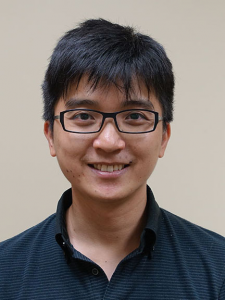Regional Mathematics and Statistics Conference
Panelists 2022
The title of this year’s panel is “What can you do with a graduate degree in math or stats?” . Are you considering graduate school, either a Masters or a PhD? Do you want to know more about what kinds of doors a graduate degree can open? Are you still deciding between academia, industry, or something else? Ask our panel and get the answers you need. A form for submitting questions ahead of time will be sent to all participants. A limited number of questions will be asked from the chat during the panel as well.

Dr. Yu-Min Chung received his PhD in mathematics from Indiana University-Bloomington in 2013. He held a Visiting Assistant Professor position at the University of Kansas and a postdoctoral position at the College of William and Mary, before joining the University of North Carolina at Greensboro as an assistant professor in 2017. In 2021, Yu-Min left UNCG to join Eli Lilly and Company as a Research Scientist. Yu-Min’s research focuses on computational topology and topological data analysis.

Dr. Karin Knudson is currently a machine learning engineer at Neumora, working on developing precision medicine for brain diseases. She got her PhD in mathematics from The University of Texas at Austin, where her research focused on compressive sensing and computational neuroscience. After her PhD, she taught high school math and computer science at Phillips Academy, Andover, later serving as chair of her department. She then returned to academic research for a time with a postdoctoral fellowship at Massachusetts General Hospital/Harvard Medical School and a research data scientist position at Tufts University, before moving to her current position.

Dr. Michael Hull received his Ph.D. in mathematics from Vanderbilt University in 2013. He held post-doctoral positions at the University of Illinois at Chicago and the University of Florida, and he is now an assistant professor at the University of North Carolina at Greensboro. His research interests include geometric group theory, low-dimensional topology, and topological data analysis.





